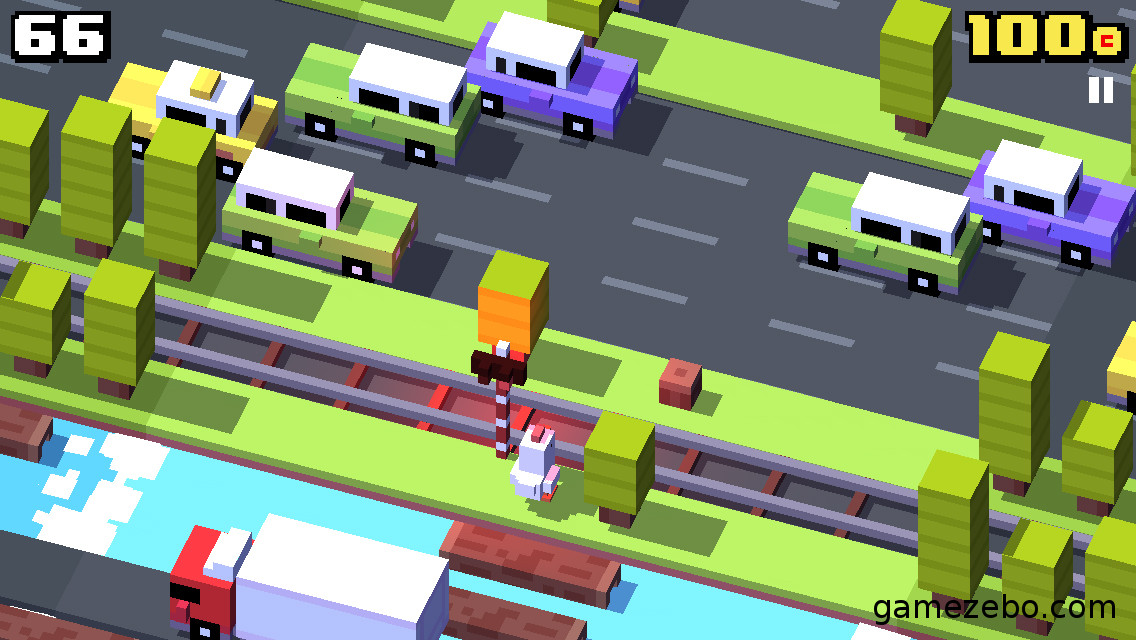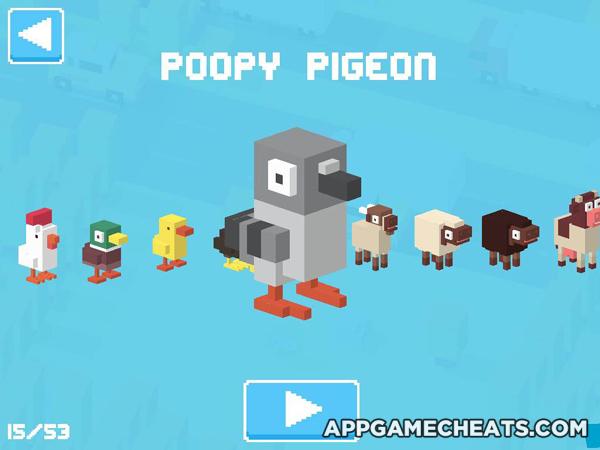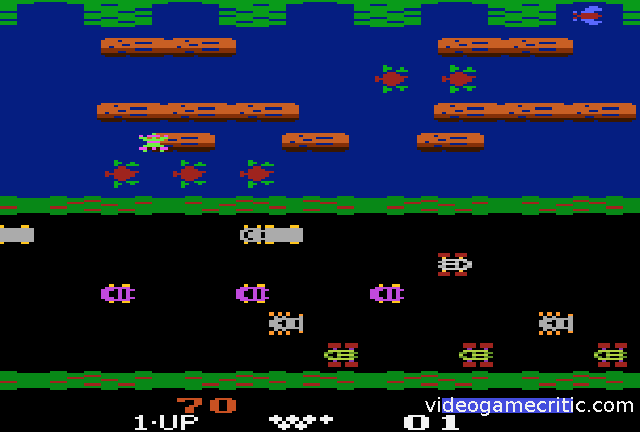Learning a language is like getting addicted to a video game
The other day I was coming home on the subway and I noticed a guy playing a game called Crossy Road on his phone. It looked just an updated version frogger, a game we used to play on Atari when I was a kid. Does anybody remember this?
Most people remember how this game works: you are the frog, and you have to jump across the road and the river, without getting hit by a car or falling into the water.
I used to love this game. And so when I saw this revitalization of that old classic, I just had to try it. I don’t normally have any games on my phone, and I almost never play any video games, but this was just too good to resist. I downloaded it, and started tapping the screen to make the frog hop forward. A minute later, I was hooked.

Why did I get so hooked on this silly little game? There was more than just some pleasant nostalgia going on here. A friend of mine once told me how video game creators carefully work to build a perfect system of challenge and rewards, and how the endorphins released from these rewards keep spurring people on to play more and more. This has worked with Crossy Road, and they have made a lot of money off it. The psychological dynamics in these games work to grip people’s minds and draw them in to spend lots of time playing them.
This works well for video games, but could it work with language learning?
Language learning is something (much more useful than video games) that requires huge amounts of our time
Let’s be honest. Being addicted to whatever you need to spend lots of time on actually helps quite a bit.
Like video games, language learning also takes lots of time. You have to keep coming back to that strange new language, again, and again, and again. To do this, you really need to get drawn in and enthralled, so that even without trying you keep picking away at the language. So let’s take some time to think through the addictive-ness of this simple little game. And then, I suggest, we can use (or fall under the influence of) these very same dynamics to get addicted to learning a language!
Could it be that the vital but often overwhelming and intimidating task of language learning could be as fun, addictive, and engrossing as some super well-designed video game? Is there something in language learning that can pull us in and hold us riveted like a kid glued to the computer? Something that would make the hours fly by, without us even trying?
Yes, yes, and yes!
Video game creators have designed an intense system to pull you into their game and get you addicted so they can take your money. I also believe that God has designed a wonderful system to pull his children into any given language so they can give hours of their time, even then even their whole lives learning to be a witness to people who need to hear about Him.
Languages can be just as addicting as video games
Crossy Road works fairly simply: the traffic on the road, the logs in the river, and the obstacles in the way are all constantly changing. You have to navigate through all of that and try to move forward, without falling behind, and without getting squished. Sometimes you see big gaps in the road that you can easily (and happily) hop across, and sometimes you’re stuck in the middle of traffic, and you’re panicking looking for a way out. You’re always thinking, always on your toes, and experiencing alternating bursts of stress and joy. Sometimes there’s ridiculous frustration… rrrrrrr… but that somehow propels you forward to get back at the game.
Communication in a foreign language your trying to learn feels about the same. It’s a mix of terror, adrenaline, frustration, and excitement. You’re confronted with questions that you understand or don’t understand, and you’re trying to keep up with what’s going on around you. The foreigner in the middle of some conversation is often about as comfortable and at home as a frog or a chicken in the middle of the road.
Immersion in a foreign language and culture is a bit like standing in the middle of a busy street, hopping around trying to squeeze your way through oncoming traffic. But you learn to wriggle quickly around tricky situations, and say what we want to say. The adrenaline rush of forming your words in real conversation, when you’re trying to keep up with the pace and the ever-changing landscape in front of you, is quite addicting.
And now back to Crossy Road… as you get the hang of the game, you get further and further without getting crushed by some semi-truck. The numbers at the top of the screen even keep track of how far forward you’ve made it, and remind you of your highest score. Every time you get close to this benchmark, for some reason there’s this ridiculous excitement that rises up inside of you. And then there’s the torrent of endorphins as you beat that high score. This is weird. Who cares if you get past 50, then 100, then 250? When you’re locked in the game, you do, a lot.
Language learning is also a challenge to keep getting past these benchmarks you set as you try to move forward into the new language. At first you can only put together and exchange a few sentences. Then, you get to the point where you can talk to someone for 2 whole minutes! That feels great! And then you hit another thrilling milestone when you can talk to someone for 15 minutes without freezing in desperation and boring the person next to you. Or there’s the first time you get to clearly explain who Jesus was, what he did, and how the person can be saved!! Each one of these achievements is a super exciting accomplishment, complete with a rush of endorphins and all.
In Crossy Road, it is kind of exciting to hop across the road, and to try to get further and further as your skill increases. But the game would get fairly boring if it were just a constant quest to push the frog across the same roads and logs over rivers again, and again, and again, as it was with the old Atari game. After all, not everyone has the drive to keep pushing themselves forward to beat endlessly increasing high scores. That kind of thing lasts a few days maybe, but most of the time gets pretty old after a week or so. And so the game designers bring something crucial in to the mix…
There are rewards along the way!
As you hop along, you can collect little shiny gold coins. If you collect 100 of these coins, you get a new character to hop around with. Some are quite funny looking, others are cute, and some are clever pop-culture references.

Then, every once and while, you just get this massive reward of 75 coins, or 225 or some other unexpected payout! Woohoo! When you first start, they pelt you with rewards all the time. This makes the game extra fun at the start, when you’re struggling to get the hang of it.

When you start learning a language (especially in the east or in an unreached language that people don’t normally bother to learn) people pelt you with rewards all the time. “Helll-o…” You might struggle to say, “ I learning you… language …” As you stutter and stumble over your words, people burst out smiling, praising and congratulating you. After all, people love babies, and baby language learners as well.
You also get to meet all kinds of new and interesting people in unexpected places, and these kind of encounters really spur you on to get drawn into the whole language learning game.
In Crossy Road, the rewards get a little more spaced out, but they do continue to show up every 6 hours or so. In fact, a little message shows up on your phone saying “your gift is waiting.” Of course, everyone wants a fun gift, and so you go back into the game, and see what’s in store. And then once you’re in the game, you find yourself spending another 2 minutes, then another 5 minutes hopping around trying to scrape up a few coins, or challenging yourself again to reach some benchmark.
All these little “just another 3 minutes” or “just 5 more coins” can add up into dozens of hours, and 1000s of coins. That’s kind of pathetic, but it’s an incredible demonstration of how little rewards can drive people on to do a ridiculous amount of any menial task.
The language learning process, a game that God really wants us to play to get the good news to every people on earth, is also designed to spur us on with all the same exciting challenges and rewards, giving us boosts of excitement and fun at just the right times.
These delightful, serendipitous rewards can be as simple as that little rush you get when you hear someone in a store using a word that you just learnt from a news article that morning. Or it could be seeing a local you met 5 months ago in the huge city, and having them smile and remember you. It could be that point where you’re watching some TV show you and you see and understand that bit of grammar you hadn’t understood yet, or it could be that rare, really great hang-out with a bunch of locals you really hit it off with. Could it be that the Father arranges these things just as providentially as our encounters with people who need the gospel? I think so.
These language encouragements can also become transmission points for the gospel. Often some great opportunity to practice the language turns into some opportunity for someone to hear about Jesus for the very first time, and then we’re really, really encouraged! The father’s food is very tasty, and very motivating. We can accept all of these encounters, whether seemingly everyday or deeply spiritual, as well timed rewards arranged by our good Father who wants to keep his children engaged in the challenge he’s setting before them.
After any one of these rewards, it’s very easy to go find “one more person to talk to” or “read just one more page.” That all adds up to ridiculous amounts of time spent in the language, and you end up building massive amounts of knowledge. As they say in Turkish, “Damlaya damlaya göl olur.” (Drop by drop, a lake is formed.)
You can build something huge if you enjoy doing little bits of it.
This is the basis of any staggering accomplishment, whether it’s a skill, or a hobby/project, or anything else. Just do a little bit, then a little bit, then a little bit more, over and over, over a long amount of time.
If you’re going to do something like getting fluent and comfortable in a new culture and language, you’re going to be slowly building a massive new network of neural synapses in your brain that will allow you to process and communicate in a whole new world. This is huge. Think of it, you’re actually building heaps of information, and countless patterns and rules into your brain. You’re relearning everything in life, all over again! You’re learning to attach a new label to every single person, object, situation, and emotion. You’re learning a complex new set of rules to string these new words together. You’re re-programming your brain to react instinctively in a different way (with your words, tone of voice, face, and body language even) to everyone and every situation you encounter.
This is a massive task, but you can tackle it bit by bit. Don’t let the hugeness of the task overwhelm you. Just get around the language, and enjoy discovering and learning every little piece that you can.
I knew someone who assembled an airplane, in their garage, in their spare time. I’m talking about an actual airplane that really could fly and carry people. How did he do it? He had a plan of how the pieces fit together, and whenever he had time, he would work on some little piece, or put in a few more rivets here and there. It’s kind of like a giant Lego project… You just have to decide it’s worth building, and then start working on it piece by piece.
Learn a language like you’d play a game
Have a look at this account of how Hudson Taylor started learning Chinese characters before he went overseas.
Hudson had neither a Chinese grammar nor a dictionary, but he had been given a copy of the gospel of Luke in the Chinese Mandarin dialect. He and cousin John set about learning together. They would select a short verse in the English version of Luke, and then pick out a dozen or more verses, also in English, which had one word in common with the first verse. Then they would turn up the first verse in Chinese, and search through all the other verses for some character in common that seemed to represent the English word. They would write these down on a slip of paper as probable equivalents; then they would look through the Chinese for this same character in different connections. If, in every case, they found the same word in the English version, they copied the character in ink in their dictionary, adding the meaning in pencil. If later study confirmed this to be the true meaning, they inked it in.
After a while they grew familiar with most of the common Chinese characters (source J. Hudson Taylor: A Man in Christ | R. Steer)
This is genius. You don’t have to treat a language like some crazy, intimidating system that needs to taught to you by a professional before you can learn anything. Treat it like a puzzle, that you can at least figure out a little bit, and get cracking. You might be surprised how fun it really is.
The biography also tells us that at around that point he started waking up at 5am to study (probably Chinese along with Biblical languages etc.) Maybe this wasn’t just brutal, old-school discipline that old missionary dudes with epic beards and stern faces applied to go through ridiculous tasks like getting scurvy on 5-month voyages. Maybe Hudson just got addicted to this little game he devised for figuring out Chinese. :)
Some people enjoy the seemingly grueling and torturous process of doing sudoku, making puzzles, gardening, building completed models, or whatever might take tons of their time. That’s because there’s all kinds of psychological and mental stimulation and rewards that drive people forward in these pursuits. So, can God can use these same psychological motivators and mental stimulations to spur his children on in good and eternal tasks like learning languages that need more witnesses of Christ? Of course!
Learning an unreached language is a fabulous use of time!
It does take a massive amount of time to learn and get comfortable in a language. It can seem like there are so many other important, serious, and productive things to do, but this is one game that is definitely worth playing. That’s because the Father longs to have people who can walk with people and lead them into righteousness and fullness in Christ in places where there are so few voices available for him. He longs to have people who can clearly explain the truth of the Gospel for people who never get to meet a real-life Christ follower they can talk to. He longs to have people who will walk with, understand, and father his precious children in dry and difficult places.
We need a childlike freedom to waste tons of time on this game we call language learning. There’s a certain task the Father has put before us: to figure out how we can crawl into a people group that thinks, acts, and speaks totally differently than us, and talk with them. That’s it. It’s pretty simple, but also totally irreplaceable. The adults are busy doing serious things in their own worlds, but the Father is calling out some to drop all of that and just play this game with him.
A kid who’s been enthralled by some video game and has tinkered with it a bunch can easily beat any adult who struggles to fumble past the first few minutes. So go ahead, take yourself and the language learning experience lightly, like a child.
Make your language learning like a little video game, something fun that you can dip into and discover for 5 minutes here, and 30 minutes there. Allow yourself to play with it a bunch, and push yourself to get out and try it with real people, struggling and flopping through real conversations. Tackle little challenges in front of you, little-by-little, and enjoy the surprises and rewards along the way.
When we think of the language as something fun to constantly play with, a lot of fears and frustrations about performance and comparison melt away.
Eventually, you’ll find you have the language sitting comfortably in your mouth, so you can constantly talk about Him with people who’ve never heard. You’ll be able to constantly let the Spirit pour out His words your mouth onto thirsty ground, and plant seeds of eternal life.
But it takes time! A foreign language and culture is something you learn and get comfortable with by being absorbed in it for countless hours. And it’s totally worth it, to give your life to be lost and dive into that world, because Christ is ready to shine through you the whole way through it. Embrace every bit of addictive fun and all the joys along the way. You’ll need it to pull you into the hours and hours of engagement that your brain needs to reach fluency.
Use the supernatural freedom you have as a child of God to propel you forward into tons of time spent on the natural process of language learning, so that just like Jesus took on flesh and lived among us, you can take on a whole new language and culture in your brain, and live among people who need to know Him.
Go ahead, fall into this game that the Father has prepared for his children who want to carry the life of Christ into other people groups who need to hear his good news.
“Let us continually offer to God a sacrifice of praise, the fruit of lips that confess his name.” (Hebrews 13:15)
“Proclaim his salvation day after day.
Declare his glory among the nations, his marvelous deeds among all peoples.” (Psalm 96:2-3)
